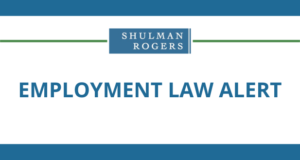March 21, 2025

|
EEOC Defines Illegal DEI Programs After weeks of confusion as to what types of DEI initiatives in the workplace can exist under the Trump Administration, the EEOC has released two new technical assistance documents defining what constitutes “illegal DEI”. The first document is a short breakdown issued jointly with the DOJ summarizing what constitutes illegal DEI and how employees can bring actions against their employers. The second document expands upon the first document and is summarized below. Employers should note that because the EEOC lacks a quorum, the new documents are not the official rule or law of the EEOC, but they do shine a light on how DEI programs will be scrutinized under the Trump Administration. Illegal DEI Practices DEI initiatives, policies, programs, or practices may be unlawful under Title VII if they involve an employment action that is motivated, in whole or in part, by an employee’s or applicant’s race, sex, or other protected characteristic. The law has not changed – as was true before, Title VII protections apply equally to all workers, including workers who are not part of a minority group or a historically under-represented group. That said, it is now the EEOC’s position that there is no such thing as “reverse” discrimination, and all discrimination claims require the same level of proof. In the DEI context, employment actions that cannot be made while considering an employee’s protected characteristic may include, but are not limited to:
DEI initiatives may also be illegal if they limit, segregate, or classify employees or applicants based on race, sex, or other protected characteristics in a way that affects their status or deprives them of employment opportunities. This prohibition applies to employee-sponsored activities such as employee resource groups or affinity groups that limit membership to individuals with certain protected characteristics. This prohibition also applies when employers separate workers into groups based on a protected characteristic when giving DEI trainings or workplace programming, even if the separate groups receive the same content or amount of training. The guidance also warns that employees may plausibly allege that workplace trainings create a hostile work environment by showing that the training was discriminatory in content, application, or context. According to the guidance, an employee’s opposition to DEI programs or trainings may be considered protected activity under Title VII if the employee provides a fact-specific basis for his or her belief that the training violates Title VII. If the opposition is considered a protected activity, employers cannot retaliate against an employee for their opposition. Addressing Common Justifications for Illegal DEI Programs The guidance also addresses many common justifications for the use of DEI initiatives. Employers cannot excuse their DEI-related considerations of protected characteristics by arguing that the protected characteristic was not the sole or deciding factor for the employer’s decision or employment. Unlawful discrimination exists even if a protected characteristic was just one factor among many contributing to the employer’s decision or action. Nor can employers excuse their DEI-related considerations of protected characteristics by arguing diversity is a business necessity, business interest, or customer/client preference. Only in very limited circumstances may employers raise the affirmative defense that hiring or classifying an individual based on religion, sex, or national origin is reasonably necessary to the normal operation of the particular business or enterprise. Employers should note this limited defense does not provide a carve-out for hiring or classifying an individual based on race or color. Takeaways Employers should look at all of their employment practices to ensure no employment decision is made, even in part, based on an individual’s protected characteristics. Employers should also evaluate their trainings and employer-sponsored activities like affinity groups and networking opportunities to ensure they are open to all employees, regardless of their race, color, religion, sex, or national origin. We understand that this is a sensitive and overwhelming area for employers to navigate. Please do not hesitate to reach out to us for assistance. |
MORE INFORMATIONThe contents of this Alert are for informational purposes only and do not constitute legal advice. If you have any questions about this Alert, please contact the Shulman Rogers attorney with whom you regularly work or a member of the Shulman Rogers Employment and Labor Law Group. To receive Employment Law Alerts and other timely news and information from Shulman Rogers, please click HERE to subscribe. |
Stay up to date with all the latest news and events.
